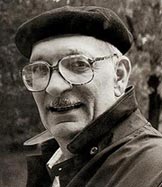
|
|||||||||
 |
The
Oberlin Bridge to Crumb Country Masked musicians march about a stage. A flutist mimics the percussive clicks of singing whales while a cellist suggests the cries of seagulls. A soprano whispers fragments of a Lorca poem and bursts into a flourish of flamenco. A pianist, back turned to his audience, strokes the strings of his instrument and sings, shouts, or whistles. An amplified string quartet shrieks an electronic chorus of neurosis punctuated by a hushed reminiscence of Schubert. This is the sonic landscape of composer George Crumb, and Oberlin musicians have been exploring its curious byways for more than three decades. Although Crumb has never officially taught at Oberlin, he has visited the campus on numerous occasions to coach musicians and oversee concerts of his music. In 1978 Oberlin formalized its appreciation of his distinct genius by awarding him an honorary Doctor of Music degree. Now approaching his 75th birthday, Crumb is receiving an honor that must be unique for a living American composer: his complete works are being committed to compact discs through a rapidly unrolling series of releases on Bridge Records, a series expected to reach a dozen volumes or more, depending on Crumb's continuing productivity. At first glance, the number of Oberlin-related performers who are turning up on Bridge's Complete Crumb Edition seems extraordinary. On deeper reflection, it seems inevitable. "That Oberlinians are drawn to Crumb is no surprise," says Tony Arnold '90, the soprano-turned-conductor-returned-soprano who is emerging as a leading diva of modern music. "Think about what draws people in general to Crumb: all of his music has a deeply spiritual aspect. His music is spiritual in a simple way, yet it's in no way simplistic. It's a mosaic of many dimensions - intellectual, emotional, spiritual. There's something about the way these characteristics combine in his music that a lot of Oberlin types would find inherently interesting." Arnold warms to the topic with growing effusiveness. She's in full Crumb mode, having just recorded all four books of the composer's Madrigals for Bridge, She encountered a good deal of his music as an undergraduate at Oberlin and first performed Crumb as a graduate student at Northwest-ern University, beginning with Book Three of the Madrigals. But participating in the recording project ushered her to a new level of involvement since the composer was on hand throughout the recording sessions, as he is for each installment of Bridge's Complete Crumb Edition. "I learned what I had already suspected all along," she reports, "which is that every note and every directive on the page is so thoroughly considered. He heard every note, every one of them. It's not that composers don't have good ears; most of them do. But to go about things with such attention is frankly unusual. He's an extremely generous person and his advice is very well considered. He was willing to work on the tiniest details for as long as it took to get a phrase just right. Through his patience I learned a lot about listening. We only had three days in which to make this recording - and we were five people who had never worked together before - yet it seemed as if we had all the time in the world. There was no stress involved, despite the incredible detail and focus of the work." Arnold's comments echo a sentiment I have often heard expressed by performers who have worked under Crumb's guidance: complete focus, limitless patience, no stress, superior result. In fact, you might imagine that a composer who has devoted so much energy to exploring the darker side of the emotional spectrum would be more than a little creepy. Crumb is not. He strikes one as an unerringly pleasant gentleman, his behavior imbued with genuine modesty, unflappable propriety, and somewhat old-fashioned formality. It cannot be said that words like "golly," "gosh," and "darn" pepper his speech, since he reserves them for moments demanding extreme emphasis. He speaks slowly but with animation, and a light drawl reveals his Appalachian origins. He was born in Charleston, West Virginia, on October 24, 1929 - a fact I have never known him to impart without adding gleefully that it happened to be Black Thursday, the very day the stock market crashed. He grew up in a musical family; went to Mason College in Charleston; completed his graduate education at the University of Illinois, Urbana-Champaign, and the University of Michigan, where he studied composition with Ross Lee Finney on his way to the DMA degree - in 1959 - and landed a position teaching piano and composition at the University of Colorado, Boulder. In 1965 he moved to the University of Pennsylvania, beginning a tenure that would last for 32 years, until his retirement in 1997. Crumb considers all of his works from the 1940s and '50s to be non-canonical curiosities, despite the fact that his Sonata for Solo Cello (1955) holds an unshakable place in the repertoire of many cellists. But in the early '60s he found his unique voice, one beholden to no discernable "school" of composition - certainly not to the 12-tone method Finney had espoused - but reflecting affection for such disparate modes of expression as Webern's meticulous pointillism, Debussy's timbral suggestiveness, Bartók's nocturnal mystery, Mahler's penchant for contrast, and Beethoven's harrowing rigor. It was also then that he grew fascinated with the sensual and surrealistic poetry of Federico García Lorca, whose texts inspired no fewer than nine of his compositions. Eight of them were spread over two concerts in Oberlin on February 26, 1972, a historic event with the New Directions Ensemble, conducted by Kenneth Moore, and featuring star contemporary-music soprano Neva Pilgrim in the four books of Madrigals as well as Carol Brunk '72 (contralto, in Night of the Four Moons and Night Music I) and faculty members Doris Kliewer (soprano, in Ancient Voices of Children) and Frederick Gersten (baritone, in Songs, Drones, and Refrains of Death). It was billed as the first-ever presentation of Crumb's complete Lorca cycle, and so it was at the time, since the ninth piece, Federico's Little Songs for Children, appeared as a happy appendage in 1986. "I really can't recall all the Lorca pieces ever being done together elsewhere," says Crumb, who was on hand for the recitals. "A good selection of them have been programmed together at festivals, but the aim at Oberlin was to present them as an all-inclusive cycle. I thought it was interesting at the time. Whether people want to hear that much all at once I can't say. I do remember that those were darn fine performances." The nine Lorca settings represent a substantial proportion of Crumb's output, since his mature catalog has not yet reached 40 pieces. He has always seemed parsimonious in doling out new compositions and on several occasions has subjected his works to substantial rewriting following their premieres. One such piece was Quest, an apt name for a piece whose gestation covered more than two decades. It was born of a suggestion by the guitarist David Starobin, a stalwart of the contemporary-music community, who in 1971 begged the composer for a guitar piece. Starobin finally had the work in hand in 1989 - a work for solo guitar assisted by soprano saxophone, double bass, harp, and percussion - and he played its premiere the following March in Philadelphia. But Crumb was unsatisfied with the piece as it stood and withdrew it for still more polishing. Finally, on April 15, 1994, Starobin unveiled the new and improved Quest - billed as a world premiere - in Oberlin's Finney Chapel, assisted by members of the Oberlin Contemporary Music Ensemble. "The quarter century was, I believe, well worth the wait," the guitarist later reported. In
the intervening years Starobin had been a busy fellow.A native New
Yorker whose education and career were resolutely centered on the
East Coast (he heads the guitar department at the Manhattan School
of Music), he was racking up an extraordinary record of premieres;
to date, some 300 works - solo pieces, chamber compositions, and
concertos - have been composed for him. In 1981 he founded Bridge
Records, which to this day he manages jointly with his wife, Becky.
The good times were rolling for the recording industry when Bridge
came into being; even during the past decade, as one label after
another has crashed and burned, Bridge has continued to flourish.
|
||||

